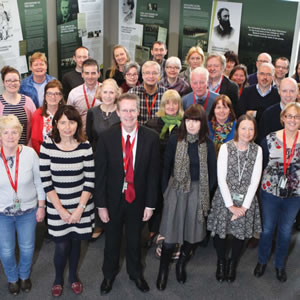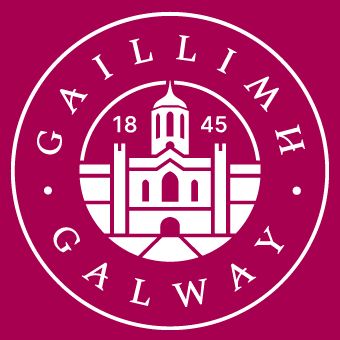- My Library Account
- Collections

Collections
The Library provides access to books, electronic resources, archives, special collections, and more to support your learning and research.
- Research

Research
The Library is committed to supporting your research needs with expert guidance and resources.
- Studying
- Academic Skills Service for Students
- Academic Writing Centre
- Assistive Technology Area
- Borrowing Limits, Lost Books & Fines
- Digital Literacy
- Equipment & More
- Group Study Rooms
- Library & IT Service Desk
- MakerSpace for Students
- Past Exam Papers
- Photocopying & Printing
- Shannon College Library
- Study Spaces
- Using Other Libraries

Studying
The Library has all the resources and supports you need to be successful in your studies at undergraduate and postgraduate level. Whether you're just starting your studies or working on your final project, we're here to help.
- Teaching

Teaching
We are here to help lecturers and academic staff deliver quality teaching and support their students' success.
- About

- Workshops & Events
Services
Digital Research & Innovation
The Library enables digital research by supporting researchers in using digital evidence, new modern methods of inquiry, research, publication, and preservation. We focus on supporting research using data, enabling infrastructures, and technology.
Digital scholarship is a term for modern scholarship that uses digital approaches and technology. Digital scholarship defines a set of services that facilitate digital research and teaching in universities and other research institutions. These services are often within the digital arena. They can encompass research support, open access, digital repositories, digital exhibitions, project management, digital publishing, metadata, impact, discovery, digital preservation, identifiers, copyright, data management, and research metrics.
The library has a digital scholarship enablement strategy, updated in 2019. The digital scholarship enablement strategy aims to provide a sustainable and usable technology and operational infrastructure for teaching and research activities.
Digital scholarship aims to develop services in three areas: open access to research output, digital archives and collections, and research data. We work on several digital projects with researchers.
How We Help
- Assignment of identifiers to promote discovery
- Hosting of digital collections in library repositories
- Open access dissemination of research outputs
- Management of research data
- Participation in text mining and data analysis
- Provision of spaces, tools, equipment and training for digital scholarship
Partners and Collaborators
- Dr. Aidan Kane, Lecturer in Economics and Research Member of the Whitaker Institute for Innovation and Societal Change.
- David Kelly, Research Technologist for the Moore Institute and the Whitaker Institute at University of Galway
- Dr. Andrew Flaus, Centre for Chromosome Biology at University of Galway
- CELT, The Centre for Excellence in Learning and Teaching, at University of Galway
- The Insight Centre for Data Analytics at University of Galway
Persistent Identifiers
A persistent identifier (PI or PID) is a long-lasting reference to a document, file, web page, or other digital object. It is linked to the current address of the metadata or content. Unlike URLs, persistent identifiers are often provided by services that allow you to update the location of the object so that the identifier consistently points to the right place without breaking. Persistent identifiers are available for people (e.g. ORCIDs), institutions (e.g. ROR), research outputs (e.g. DOI). There are also product identifiers for books (ISBNs) and journals (ISSNs).
Further information is available in the Library Guide on Identifiers and to request a DOI or ISBN please contact Trish Finnan, Digital Publishing and Data Management Librarian.
Any Questions

Trish Finnan
Digital Publishing and Data Management Librarian
Email: trish.finnan@universityofgalway.ie
091 49 5961
Research Data Management
The purpose of research data management is to maximise the academic value of research data by ensuring that such data is managed according to good practices for collection, curation, storage, management, retrieval, re-use, sharing, archiving, and access, appropriate for the data and discipline concerned, and thereby to ensure compliance with the requirements of funding agencies and other stakeholders.
The aim of this policy is to advise University of Galway staff engaged in Research on their responsibilities with regard to data collected/stored as part of a research project in which University of Galway staff/students are engaged in, and the supports that are available for same, and to ensure that research data is managed in line with Data Protection Regulations. The policy covers all research related data generated, collected and processed by University of Galway staff as part of a project, which is led or contributed to by University of Galway staff/students.
For further information, guidance and support please consult the Library Guide on Research Data Management. It includes information about Data Management Plans, typical data-related activities undertaken in the research data lifecycle as well as how to find and cite data.
Visit the Library Guide on Research Data Management to learn about:
- Benefits of good research data management practice
- Data creation and collection
- Data management plans
- FAIR Data & Open Outputs
- Storage and backup
- Sharing and Preservation
- Training, courses, resources, and contacts
See Research Data Management Policy at the University of Galway
About
Open Publishing grants free and open online access to academic information.
Initially, the Open Access movement focused mainly on journal articles and the business model of journals themselves, giving rise to Open Access journals.
The broader concept includes research outputs such as monographs, data, or code.
Open Publishing in University of Galway
Unrestricted and Open Access to a study’s findings and the journal articles, books or other publications arising from the study is at the heart of Open Scholarship. The University of Galway is committed to increasing Open Access to our research publications.
- As part of the IReL consortium we negotiate Open Access deals with publishers so our researchers can publish Gold Open Access with no cost to the author.
- Our Open Access to Research Outputs Policy commits University of Galway to Open Access and articulates expectations on our researchers.
- The University of Galway Research Repository enables Green Open Access.
- We are negotiating publishing deals to enable University of Galway authors to publish Gold Open Access without payments. For example, the deal with Elsevier.
If you have any questions regarding Open Access, email hardy.schwamm@universityofgalway.ie
Submitting a Thesis to the University Collections
The Library gives you access to research and taught theses. View the Finding Theses Guide for advice on locating the research you're looking for.
Review the process for submitting your thesis below.
Taught Masters
Submission: Electronic copy submitted to Taught Master's theses database following direction by Supervisor/Programme Director.
Procedure: See instructions on the Taught Thesis Submission System.
PhD/MD/Research Masters’ Thesis
Submission: Submit a print copy to the examinations office and upload an electronic version to University of Galway Research Repository.
Procedure: As advised by the supervisor. See our guide for uploading your thesis to University of Galway Research Repository.
Any Questions

Library and IT Service Desk
Library and IT Service Desk
Email: library@universityofgalway.ie
091 49 3399











